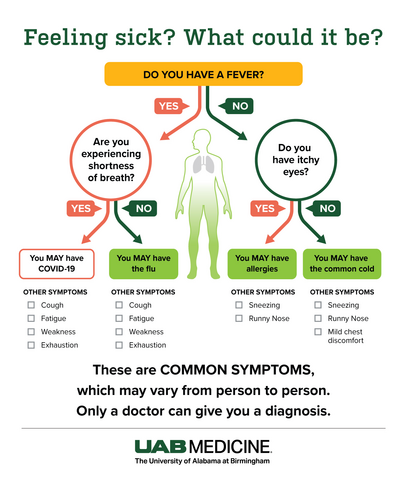 Click image to enlarge.
Click image to enlarge.
Graphic by: Jody PotterAs flu season ramps up, health care systems across the country are bracing for an influx of patients with common illnesses. To ease the strain on health care workers and ensure the right care is received, it is essential to understand the key differences between the flu, COVID-19, and the common cold.
Prevention and Treatment
To prevent the flu or minimize its symptoms, get vaccinated and practice good hygiene. For COVID-19, the flu and the common cold, rest, hydration and over-the-counter medications can help manage symptoms.
“It is very important for everybody to think about prevention and staying stronger together,” said Rachael Lee, M.D., University of Alabama at Birmingham chief health care epidemiologist. “That is our goal for this year. One of the ways to do that is vaccines.”
Lee says there is a specific time that she typically recommends getting these vaccines, and that is right at the beginning of the respiratory season.
“Right now is actually a great time,” she said. “The antibodies that we produce from those vaccines should protect us throughout the respiratory virus season.
Key Differences:
• COVID-19: variety of symptoms, from mild to severe, including fever, sore throat, headache and sometimes shortness of breath
• Flu: sudden onset, often with fever, muscle aches and cough, and typically lasts about a week
• Common Cold: gradual onset, mild symptoms and no fever
• Allergies: no fever, runny or stuffy nose, and often triggered by seasonal factors
Convenient Care Options
UAB eMedicine offers online urgent care to get diagnosed and treated for common illnesses like colds, flu and sinus infections from the comfort of your home. Answer questions about how you are feeling in an online form and a UAB provider will share your diagnosis, treatment plan and send any needed prescriptions to your pharmacy in about an hour. The cost is $25, and you must be at least 18 years old.
By understanding the differences between these illnesses and utilizing convenient health care options, proactive steps can be taken to protect one’s health and support the health care system during this busy season.